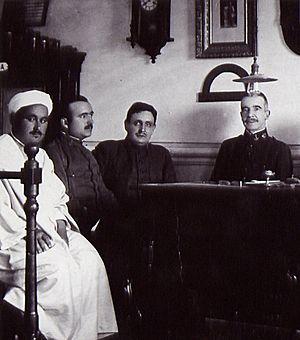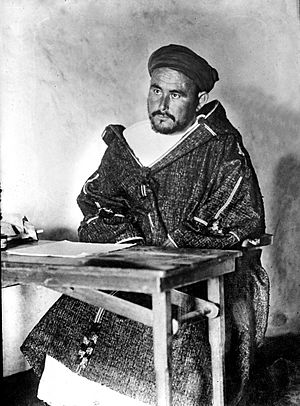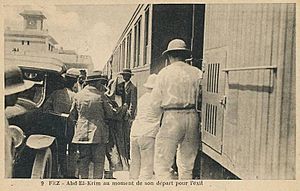Abd el-Krim facts for kids
Quick facts for kids
Abd el-Krim
|
|
|---|---|
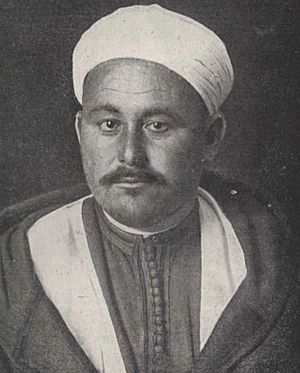
Abd al-Karim in 1922
|
|
| President of the Republic of the Rif | |
| In office 18 September 1921 – 27 May 1926 |
|
| Prime Minister | Hajj Hatmi |
| Preceded by | 'New establishment' (Spanish protectorate in Morocco) |
| Personal details | |
| Born | 1882 or 1883 Ajdir, Morocco |
| Died | 6 February 1963 Cairo, Egypt |
| Spouse | Lalla Mimouna Boujibar |
| Alma mater | University of al-Qarawiyyin |
| Military service | |
| Allegiance | |
| Years of service | 1921–1926 |
| Battles/wars | Rif War
|
Muhammad ibn Abd al-Karim al-Khattabi (Arabic: محمد بن عبد الكريم الخطابي), known as Abd el-Krim, was an important Moroccan leader. He was born in 1882 or 1883 in Ajdir, Morocco, and passed away in 1963 in Cairo, Egypt. He became the President of the Republic of the Rif.
Abd el-Krim and his brother, M'Hammad, led a big uprising. They brought together many Riffian tribes to fight against the French and Spanish who were trying to take over their land in the Rif region of Morocco. Abd el-Krim was famous for his smart fighting methods, called guerrilla tactics. He even used tunnels, which was a new idea in modern warfare at the time. His strategies inspired other famous leaders like Ho Chi Minh, Mao Zedong, and Che Guevara.
Contents
Growing Up and Education
Muhammad ibn Abd al-Karim was born in Ajdir, Morocco. His father, Abd al-Karim al-Khattabi, was a respected qadi, which is an Islamic judge and a main local leader.
Abd el-Krim went to a local school in Ajdir. He also studied in Tétouan and for two years in Fez. He then attended the University of al-Qarawiyyin, which is one of the oldest universities in the world. Both Abd el-Krim and his brother M'Hammad also learned Spanish. His brother even studied mining engineering in Spain. They both spoke Spanish and the local Riffian language very well.
After his studies, Abd el-Krim worked in Melilla. Melilla is a Spanish city on the coast of Morocco. He was a teacher and a translator for the Spanish government's 'native affairs' office. He also worked as a journalist for a Spanish newspaper called Telegrama del Rif. He wrote articles in Arabic, supporting how European ideas and technology could help improve life for the Moroccan people. He became known for being smart and efficient.
During World War I
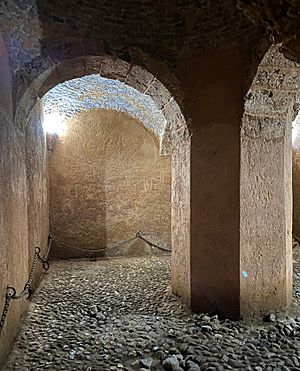
Abd el-Krim continued to work for the Spanish government. He became a chief judge for Melilla in 1915. He also taught at a Spanish-Arabic school and edited the Arabic part of the newspaper, El Telegrama del Rif.
Before and during World War I, Abd el-Krim was seen as friendly towards Germany. He even offered to help Germans get mining licenses in the Rif mountains. Because of this, and other complaints, Spanish authorities arrested him. He was put in prison in Chefchaouen from 1916 to 1918. He managed to escape and got his job back as a judge in Melilla.
After the war, Abd el-Krim went back to his home in Ajdir in 1919. He was worried about Spanish agents in his tribal area. He decided it was time to fight for his tribe's freedom.
In 1920, Abd el-Krim and his brother started a rebellion against the Spanish. Their main goal was to unite the tribes of the Rif into an independent country called the Republic of the Rif. They also wanted to end French and Spanish control in Morocco and bring in modern changes.
Leading the Fight
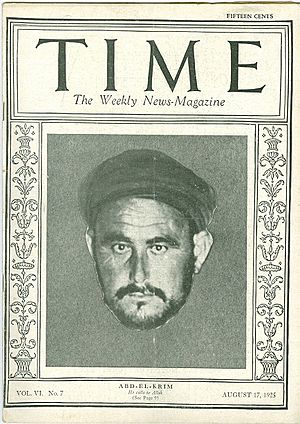
In 1921, Spanish troops moved into areas of the Rif that were not controlled by anyone. Abd el-Krim warned the Spanish general, Manuel Fernández Silvestre, that if his troops crossed the Ameqqran River, it would mean war. The general ignored the warning and crossed the river with 60,000 soldiers.
Soon after, a large Riffian force attacked a Spanish military post. They killed many Spanish soldiers. Abd el-Krim then led his forces to attack the main Spanish army camp at Anwal. This was a huge success for the Riffians. In just three weeks of intense fighting, 13,000 Spanish and colonial troops were killed.
This major victory made Abd el-Krim famous as a master of guerrilla warfare. He became the president of the Republic of the Rif. By July, most of the remaining Spanish soldiers had fled to the coast, defeated by about 30,000 Riffian fighters.
The big defeat at Annual caused a lot of problems for the Spanish government. A military leader named Miguel Primo de Rivera took control of Spain in 1923.
By 1924, the Spanish forces had to retreat to just three cities on the Moroccan coast: Tetouan, Ceuta, and Melilla. These last two are still Spanish cities today.
In April 1925, Abd el-Krim's forces moved into French-controlled Morocco, reaching as far as Fez. This made France decide to act strongly. In 1925, France and Spain worked together. They sent a huge combined army of over 250,000 soldiers to Morocco, led by Marshal Henri Philippe Pétain. This army had many aircraft and artillery.
In September 1925, the Spanish army, supported by a combined Spanish-French fleet, landed in Alhucemas bay. This was very close to Abd el-Krim's capital and birthplace, Axdir. French troops also came from the south.
The fighting was very intense and lasted for ten months. The combined French and Spanish armies used chemical bombs against the local people. Eventually, they defeated Abd el-Krim's forces. On May 26, 1926, Abd el-Krim surrendered to the French.
Life in Exile
|
Part of a series on the
|
|---|
| History of Morocco |
 |
|
|
Classical to Late Antiquity
(8th century BC – 7th century AD) |
|
|
|
|
|
|
Related topics
|
After he surrendered, Abd el-Krim was sent away to the island of Réunion. This is a French territory in the Indian Ocean. He lived there from 1926 to 1947. He had a comfortable home and received money each year. Even in exile, he continued to speak out against Western influence on Moroccan culture.
In 1947, Abd el-Krim was allowed to move to the south of France for health reasons. However, he managed to get permission to live in Egypt instead. In Egypt, he led a group called the Liberation Committee of the Arab Maghreb. This group worked for the independence of North African countries.
When Morocco became independent in 1956, Mohammed V of Morocco invited Abd el-Krim to come back home. But he refused. He said he would not return as long as French forces were still in North Africa. From Egypt, he supported the Rif revolt in 1958 against the Moroccan government.
Death
Abd el-Krim passed away in 1963. He lived long enough to see Algeria gain its independence. This meant that his dream of a North Africa free from colonial powers had finally come true.
Family
Abd el-Krim had 6 sons and 5 daughters with two different women.
Honors and Awards
 Spain:
Spain:
 Order of Isabella the Catholic (Knight's Cross; 1910)
Order of Isabella the Catholic (Knight's Cross; 1910) Cross of Military Merit (Grand Cross - Red Decoration; 1910)
Cross of Military Merit (Grand Cross - Red Decoration; 1910) Cross of Military Merit (Grand Cross - White Decoration; 1910)
Cross of Military Merit (Grand Cross - White Decoration; 1910) Medalla de África (Medal; 1910)
Medalla de África (Medal; 1910) Medalla de la Paz de Marruecos (Medal; 1910)
Medalla de la Paz de Marruecos (Medal; 1910)
Images for kids
See Also
 In Spanish: Abd el-Krim para niños
In Spanish: Abd el-Krim para niños


